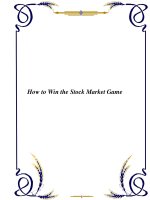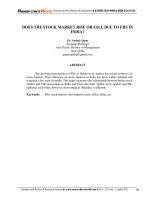Welcome to the Stock Market
Bạn đang xem bản rút gọn của tài liệu. Xem và tải ngay bản đầy đủ của tài liệu tại đây (333.06 KB, 16 trang )
1
3
Welcome to the
Stock Market
You may be surprised, but the market is not as difficult to understand as
you might think. By the time you finish reading this chapter, you
should have enough knowledge of the market to allow you to sail
through the rest of the book. The trick is to learn about the market in
small steps, which is exactly how I present the information to you.
The Stock Market: The Biggest Auction in the World
Think of the stock market as a huge auction or swap meet (some might
call it a flea market) where people buy and sell pieces of paper called
stock. On one side, you have the owners of corporations who are look-
ing for a convenient way to raise money so that they can hire more
employees, build more factories or offices, and upgrade their equip-
ment. The way they raise money is by issuing shares of stock in their
corporation. On the other side, you have people like you and me who
buy shares of stock in these corporations. The place where we all meet,
the buyers and sellers, is the stock market.
CHAPTER
10381_Sincere_01.c 7/18/03 10:57 AM Page 3
Copyright © 2004 by The McGraw-Hill Companies, Inc. Click here for Terms of Use.
What Is a Share of Stock?
We’re not talking about livestock! Actually, the word stock originally
did come from the word livestock. Instead of trading cows and sheep,
however, we trade pieces of paper that represent ownership—shares—
in a corporation. You may also hear people refer to stocks as equities or
securities. Most people just call them stocks, which means supply.
(After all, the entire stock market is based on the economic theory of
supply and demand.)
When you buy shares of stock in a corporation, you are com-
monly referred to as an investor or a shareholder. When you own a
share of stock, you are sharing in the success of the business, and you
actually become a part owner of the corporation. When you buy a
stock, you get one vote for each share of stock you own. The more
shares you own, therefore, the more of the corporation you control.
Most shareholders own a tiny sliver of the corporation, with little
control over how the corporation is run and no ability to boss anyone
in the corporation around. You’d have to own millions of shares of
stock to become a primary owner of a corporation whose stock is
publicly traded.
In summary, a corporation issues shares of stock so that it can
attract money. Investors are willing to buy stock in a corporation in
order to receive the opportunity to sell the stock at a higher price. If the
corporation does well, the stock you own will probably go up in price,
and you’ll make money. If the corporation does poorly, the stock you
own will probably go down in price, and you’ll lose money (if you sell,
that is).
Stock Certificates: Fancy-Looking Pieces of Paper
Stock certificates are written proof that you have invested in the cor-
poration. (Some people don’t realize that you invest in companies,
not stocks.) Although some people ask for the stock certificates so
that they can keep them in a safe place, most people let a brokerage
firm hold their stock certificates. It is a lot easier that way. To be
4
U
NDERSTANDING
S
TOCKS
10381_Sincere_01.c 7/18/03 10:57 AM Page 4
technical, there are actually two kinds of stock, common and pre-
ferred. In this book, we will always be talking about common stock,
because that is the only type that most corporations issue to
investors. Remember, not all companies issue stock. A company has
to be what is called a corporation, a legally defined term. Most of the
large companies you have heard of are corporations, and, yes, their
stocks are all traded in the stock market. I’m talking about corpora-
tions like Microsoft, IBM, Disney, General Motors, General Electric,
and McDonald’s.
You Buy Stocks for Only One Reason: To Make Money
The stock market is all about making money. Quite simply, if you buy
stock in a corporation that is doing well and making profits, then the
stock you own should go up in price. (By the way, the profits you make
from a stock are called capital gains, which are the difference between
what you paid for a stock and what you sold it for. If you lose money, it
is called a capital loss.)
You make money in the stock market by buying a stock at one price
and selling it at a higher price. It’s that simple. There is no guarantee, of
course, that you’ll make money. Even the stocks of good corporations
can sometimes go down. If you buy stocks in corporations that do well,
you should be rewarded with a higher stock price. It doesn’t always
work out that way, but that is the risk you take when you participate in
the market.
New York: Where Stock Investing Became Popular
Before there was a place called the stock market, buyers and sellers had
to meet in the street. Sometime around 1790, they met every weekday
under a buttonwood tree in New York. It just happened that the name of
the street where all this took place was Wall Street. (For history buffs,
the buttonwood tree was at 68 Wall Street.)
A lot of people heard what was happening on Wall Street and
WELCOME TO THE STOCK MARKET
5
10381_Sincere_01.c 7/18/03 10:57 AM Page 5
wanted a piece of the action. On some days, as many as 100 shares of
stock were exchanged! (In case you don’t think that’s funny, in today’s
market, billions of shares of stock are exchanged every day.)
It got so crowded in the early days that 24 brokers and merchants
who controlled the trading activities decided to organize what they
were doing. For a fixed commission, they agreed to buy and sell shares
of stock in corporations to the public. They gave themselves a quarter
for each share of stock they traded (today we would call them stock-
brokers). The Buttonwood Agreement, as it was called, was signed in
1792. This was the humble beginning of the New York Stock Exchange
(NYSE).
It wasn’t long before the brokers and merchants moved their
offices to a Wall Street coffee shop. Eventually, they moved indoors
permanently to the New York Stock Exchange Building on Wall Street.
Keep in mind that a stock exchange is simply a place where people go
to buy and sell stocks. It provides an organized marketplace for stocks,
just as a supermarket provides a marketplace for food.
Even after 200 years, the name Wall Street is a symbol for the U.S.
stock exchanges and the financial institutions that do business with
them, no matter what their physical location. If you go to New York,
you’ll see that Wall Street is just a narrow street in the financial district
of Lower Manhattan. Therefore, the stock market, or Wall Street, is
really a convenient way of talking about anyone or anything connected
to our financial markets.
Three Major Stock Exchanges
After the NYSE was formed, there were also brokers trading stocks who
weren’t considered good enough for the New York Stock Exchange.
Traders who couldn’t make it on the NYSE traded on the street curb,
which is why they were called curbside traders. Eventually, these traders
moved indoors and established what later became the American Stock
Exchange (AMEX).
There is also a third major stock exchange, the National Association
of Securities Dealers Automated Quotation System (Nasdaq), which
6
U
NDERSTANDING
S
TOCKS
10381_Sincere_01.c 7/18/03 10:57 AM Page 6
was created in 1971. This was the first electronic stock exchange; it was
hooked together by a network of computers. (Yes, they did have com-
puters back then.)
Competition is good for the stock market. It forces the stock
exchanges to fill your orders faster and more cheaply. After all, they want
your business. There are stock exchanges in nearly every country in the
world, although the U.S. market is the largest. U.S. stock exchanges other
than the three major ones include the Cincinnati Stock Exchange, the
Pacific Stock Exchange, the Boston Stock Exchange, and the Philadel-
phia Stock Exchange (the Philadelphia Stock Exchange is our country’s
oldest organized stock exchange). Other countries with stock exchanges
include England, Germany, Switzerland, France, Holland, Russia, Japan,
China, Sweden, Italy, Brazil, Mexico, Canada, and Australia, to name
only a few.
A few years ago, in order to compete more effectively against the
NYSE, the National Association of Securities Dealers (NASD), which
owns the Nasdaq, and the AMEX merged. Although the two exchanges
are operated separately, the merger allowed them to jointly introduce
new investment products. This is interesting, but it doesn’t really affect
you as an investor. In the end, it doesn’t really matter from which
exchange you buy stocks.
Joining a Stock Exchange
It’s not easy for a corporation to be listed on, or join, a stock exchange
because each exchange has many rules and regulations. It can take
years for a corporation to meet all the requirements and join the
exchange. The stock exchanges list corporations that fit the goals and
philosophy of the particular exchange.
For example, the companies that are listed on the NYSE are some of
the best-known and biggest corporations in the United States—blue-chip
corporations like Wal-Mart, Procter & Gamble, Johnson & Johnson, and
Coca-Cola. The Nasdaq, on the other hand, contains many technology
corporations like Cisco Systems, Intel, and Sun Microsystems. In addi-
tion, stocks that are traded “over the counter” (OTC) are located on the
WELCOME TO THE STOCK MARKET
7
10381_Sincere_01.c 7/18/03 10:57 AM Page 7
Nasdaq. By the way, there are over 5000 stocks traded on the three U.S.
stock exchanges and another 5000 smaller companies traded over the
counter.
Corporations: Convincing People to Buy Their Stock
Once a corporation goes public and allows its stock to be traded, the
trick is to convince investors that the corporation will be profitable.
Corporations do everything in their power to attract money from in-
vestors. Bigger corporations spread the word through print and televi-
sion advertising. Smaller corporations might rely on word of mouth,
emails, or news releases. The more people there are who believe in a
corporation, the more people there will be who will buy its stock, and
the more money the people on Wall Street will make. Now do you
understand why everyone is always saying such good things about the
market? If you’re lucky, you’ll also make a few bucks if you invest in a
profitable corporation.
Now that you have some idea of what happens in the back rooms of
the stock brokerage, I’m going to take you upstairs. First, I will intro-
duce you to the three types of people who participate in the market:
individual investors, traders, and professionals. By the time you finish
this book, you should have a better idea of where you fit in.
Individual Investors
Investors buy stocks in corporations that they believe in and plan to
hold those stocks for the long term (usually a year or longer). Investors
generally choose to ignore the short-term day-to-day price fluctuations
of the market. If all goes according to plan, they find that the value of
their investment has increased over time.
One of the most profitable buy-and-hold investors of our time,
Warren Buffett, likes to say that he is not buying a stock, he is buying a
business. He buys stocks for the best price he can and holds them as
8
U
NDERSTANDING
S
TOCKS
10381_Sincere_01.c 7/18/03 10:57 AM Page 8









